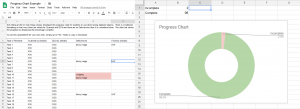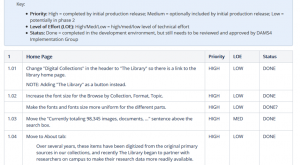Project Templates: Difference between revisions
Cristelags (talk | contribs) No edit summary |
Cristelags (talk | contribs) No edit summary |
||
| (6 intermediate revisions by the same user not shown) | |||
| Line 1: | Line 1: | ||
Project Templates are useful for expressing information in a systematic manner, streamlining processes and saving time and energy. Templates can provide clearer communication and consistency across project. Included are templates provided by different institutions. Please contribute your project template examples to the '''[[DLF Project Managers Toolkit]]'''. If you have examples to share, please provide some context, such as the purpose or goal, institution, teams and team size, any issues or solutions relating to the specific project template. | Project Templates are useful for expressing information in a systematic manner, streamlining processes and saving time and energy. Templates can provide clearer communication and consistency across project. Included are templates provided by different institutions. Please contribute your project template examples to the '''[[DLF Project Managers Toolkit]]'''. If you have examples to share, please provide some context, such as the purpose or goal, institution, teams and team size, any issues or solutions relating to the specific project template. | ||
=== Communication Plan === | |||
Communication is critical to the success of any project. Consider the frequency (weekly, monthly, quarterly) and methods (in-person, email, im, blog, etc.) to spell out the who, what, when, where, why and how in a communication plan. It is important to discuss working culture and styles, and consider the resources and skills. When choosing project management tools and communication methods, think about what is already in place and make use of it (e.g. Word, Excel, Outlook, Google Suite, Slack, and other project management software). | |||
The following is an example of a communication plan of a library-wide implementation team used at the UC San Diego Library for a large one year project. This simple table view shows the stakeholder name or group, the method by which a project manager should communicate with them, and the frequency at which the communication should occur. | |||
[[File:UCSanDiegoLibrary CommunicationPlan.png|thumb|center|UC San Diego Library Implementation Team Communication Plan]] | |||
=== Progress Chart === | === Progress Chart === | ||
Kirk Wang at the UC San Diego Library developed this progress chart for students to use when QCing digitized objects. There is conditional formatting so that once there are initials for Scanned and QC'd and there are no | Kirk Wang at the UC San Diego Library developed this progress chart for students to use when QCing digitized objects in Google Sheets. There is conditional formatting so that once there are initials for Scanned and QC'd and there are no Issues then it is considered done. The other tab shows the progress by displaying the percentage complete. To use this spreadsheet for your own work, simply go to '''[https://docs.google.com/spreadsheets/d/1H4My83qpOWSDMpdbDPcI_VRTjFZnBOy0W5B0xjMdlBc/edit#gid=0 Progress Chart Example]''', select File > Make a copy or Download. | ||
[[File:UCSDProgressChart.png|thumb|center|UC San Diego Library Progress Chart]] | |||
=== Priority Chart === | |||
A priority chart is a decision-making tool to compare priority, level of effort, and track the status. Commonly used at UC San Diego Library when doing development on the digital collections website, this priority chart was created in Confluence and it is used to assist with determining the best way to allocate resources when incorporating website features and enhancements. | |||
[[File:UCSanDiegoLibrary PriorityChart.png|thumb|center|UC San Diego Library Priority Chart]] | |||
=== Gantt Chart === | |||
one page project manager template https://www.oppmi.com | |||
Eric Stedfeld, NYU Libraries. Exploring the One Page Project Manager. DLF Fall Forum 2008, Providence, RI. November 14, 2008 http://old.diglib.org/forums/fall2008/presentations/Stedfeld.pdf | |||
[[File:DLF2008Stedfeld.pdf|thumb|center|Exploring the One Page Project Manager]] | |||
=== Kick-off Meeting Template === | |||
Project kick-off meetings in many ways (for better or worse) set the tone for the rest of the project. Make sure you have a basic understanding of the key project elements (e.g. scope, goals, stakeholders, deliverables, etc.) before the meeting. | |||
Agenda: | |||
Introductions (optional if members are acquainted) | |||
Project Background / Define the project | |||
Review the project plan | |||
Review roles & responsibilities | |||
Access & Permissions to project tools, file directories, documentation, etc. | |||
Address any risks or issues involved in the project | |||
Discuss next steps | |||
Communication going forward | |||
Meeting schedule | |||
Action items/follow-up | |||
Useful tips from [http://www.techrepublic.com/article/follow-these-steps-to-conduct-an-effective-project-kickoff-meeting/1038766 Tech Republic article]: | |||
Establish an organized presence. Demonstrate to your team that you are on top of things. | |||
Empower the team members. Give each team member responsibilities and expect them to accomplish their assigned tasks. | |||
Create teamwork. Encourage all to help one another and to be accountable to the project. Everyone pulling together for a common cause can have dramatic results. | |||
Demonstrate leadership. Organize, empower, and develop the team, and everyone will see your leadership and follow. | |||
== References == | |||
Project Management Institute. 2018. A guide to the project management body of knowledge: (PMBOK® guide). Newtown Square, Pennsylvania, USA: Project Management Institute. | |||
Tate, Karen, and Cynthia Snyder. 2006. The advanced project management memory jogger: a pocket guide for experienced project professionals. Salem, NH: GOAL/QPC. | |||
http://www.techrepublic.com/article/follow-these-steps-to-conduct-an-effective-project-kickoff-meeting/1038766 | |||
https://pma.doit.wisc.edu/plan/1/what.html | |||
There are lots of great articles, presentations and grey lit out there on project management and digital libraries. We've created a Zotero Group library at https://www.zotero.org/groups/2205688/dlf_pmg? and encourage you to add more when you read something good. | |||
Latest revision as of 17:09, 14 October 2018
Project Templates are useful for expressing information in a systematic manner, streamlining processes and saving time and energy. Templates can provide clearer communication and consistency across project. Included are templates provided by different institutions. Please contribute your project template examples to the DLF Project Managers Toolkit. If you have examples to share, please provide some context, such as the purpose or goal, institution, teams and team size, any issues or solutions relating to the specific project template.
Communication Plan
Communication is critical to the success of any project. Consider the frequency (weekly, monthly, quarterly) and methods (in-person, email, im, blog, etc.) to spell out the who, what, when, where, why and how in a communication plan. It is important to discuss working culture and styles, and consider the resources and skills. When choosing project management tools and communication methods, think about what is already in place and make use of it (e.g. Word, Excel, Outlook, Google Suite, Slack, and other project management software).
The following is an example of a communication plan of a library-wide implementation team used at the UC San Diego Library for a large one year project. This simple table view shows the stakeholder name or group, the method by which a project manager should communicate with them, and the frequency at which the communication should occur.

Progress Chart
Kirk Wang at the UC San Diego Library developed this progress chart for students to use when QCing digitized objects in Google Sheets. There is conditional formatting so that once there are initials for Scanned and QC'd and there are no Issues then it is considered done. The other tab shows the progress by displaying the percentage complete. To use this spreadsheet for your own work, simply go to Progress Chart Example, select File > Make a copy or Download.

Priority Chart
A priority chart is a decision-making tool to compare priority, level of effort, and track the status. Commonly used at UC San Diego Library when doing development on the digital collections website, this priority chart was created in Confluence and it is used to assist with determining the best way to allocate resources when incorporating website features and enhancements.

Gantt Chart
one page project manager template https://www.oppmi.com
Eric Stedfeld, NYU Libraries. Exploring the One Page Project Manager. DLF Fall Forum 2008, Providence, RI. November 14, 2008 http://old.diglib.org/forums/fall2008/presentations/Stedfeld.pdf File:DLF2008Stedfeld.pdf
Kick-off Meeting Template
Project kick-off meetings in many ways (for better or worse) set the tone for the rest of the project. Make sure you have a basic understanding of the key project elements (e.g. scope, goals, stakeholders, deliverables, etc.) before the meeting.
Agenda:
Introductions (optional if members are acquainted)
Project Background / Define the project
Review the project plan
Review roles & responsibilities
Access & Permissions to project tools, file directories, documentation, etc.
Address any risks or issues involved in the project
Discuss next steps
Communication going forward
Meeting schedule
Action items/follow-up
Useful tips from Tech Republic article:
Establish an organized presence. Demonstrate to your team that you are on top of things. Empower the team members. Give each team member responsibilities and expect them to accomplish their assigned tasks. Create teamwork. Encourage all to help one another and to be accountable to the project. Everyone pulling together for a common cause can have dramatic results. Demonstrate leadership. Organize, empower, and develop the team, and everyone will see your leadership and follow.
References
Project Management Institute. 2018. A guide to the project management body of knowledge: (PMBOK® guide). Newtown Square, Pennsylvania, USA: Project Management Institute. Tate, Karen, and Cynthia Snyder. 2006. The advanced project management memory jogger: a pocket guide for experienced project professionals. Salem, NH: GOAL/QPC. http://www.techrepublic.com/article/follow-these-steps-to-conduct-an-effective-project-kickoff-meeting/1038766 https://pma.doit.wisc.edu/plan/1/what.html
There are lots of great articles, presentations and grey lit out there on project management and digital libraries. We've created a Zotero Group library at https://www.zotero.org/groups/2205688/dlf_pmg? and encourage you to add more when you read something good.

